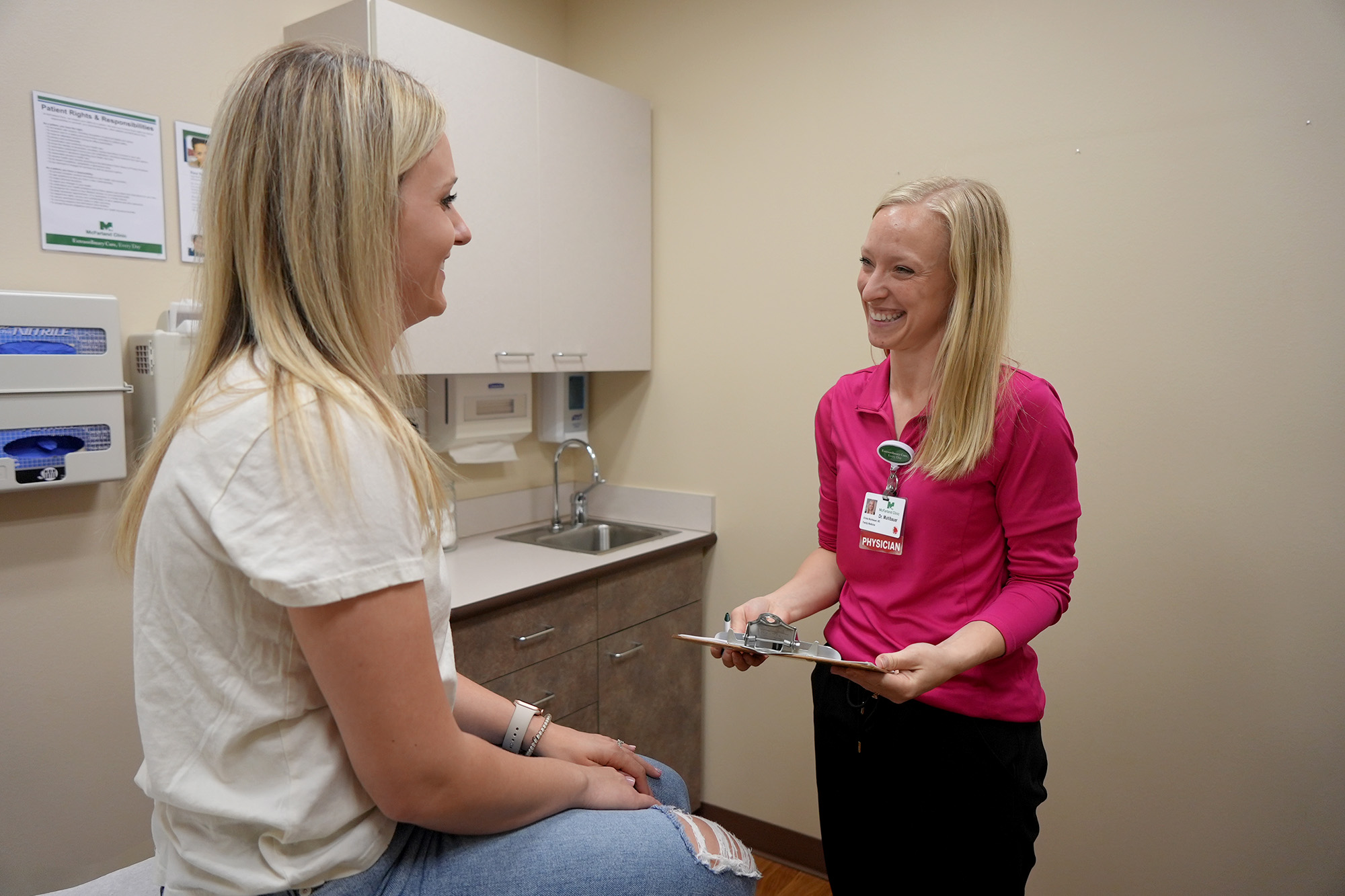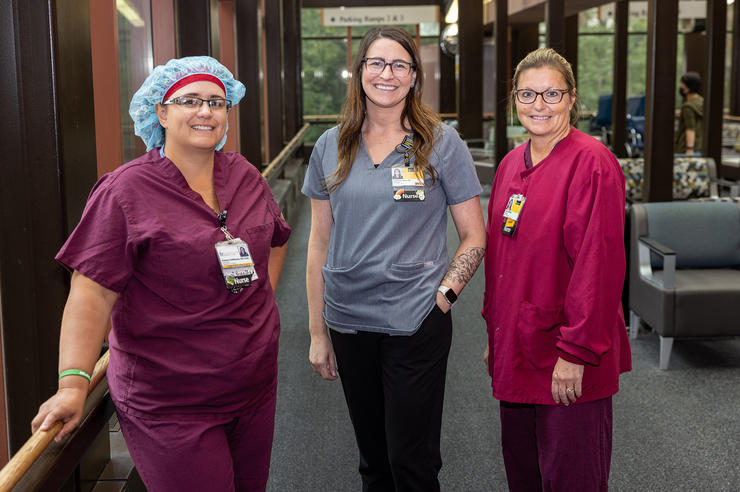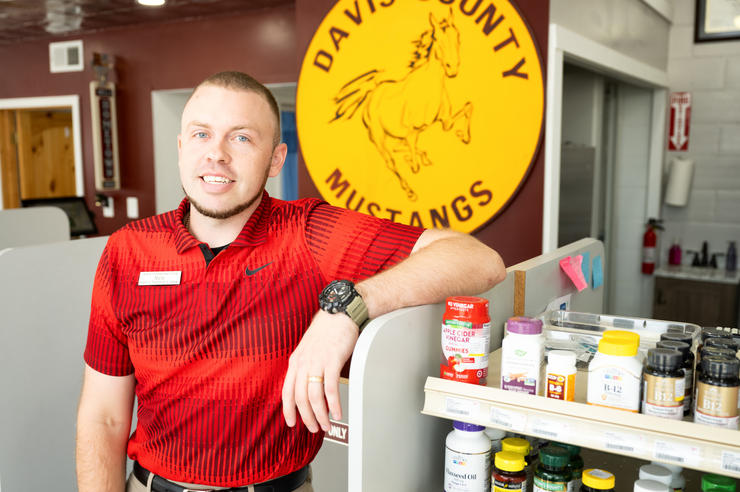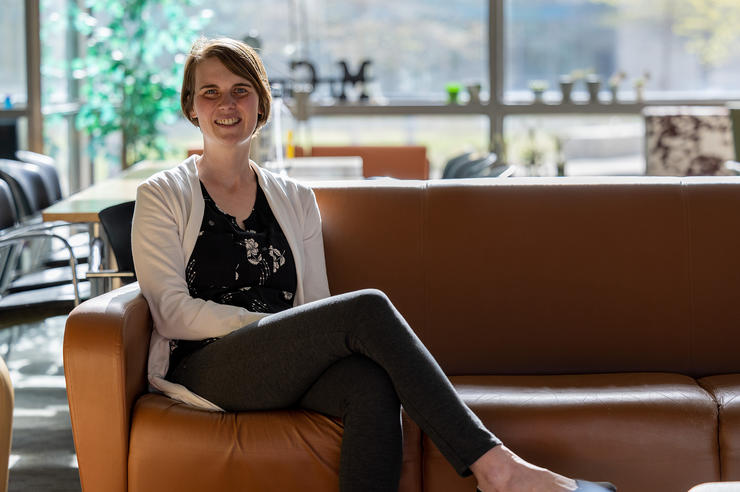Medicine alum answers call to serve western Iowans

On the family farm near Manning, Iowa, where Ericka Muhlbauer (née Tank) was raised, her father grew alfalfa, corn, and soybeans. The family also raised cow-calf pairs and chickens and had two horses, dogs and cats, and a pet turkey named Wallace.
“Springtime on the farm was my favorite,” she remembers. “I loved calving season. I thought I would be a large animal vet someday.”
She looked up to her mother, who worked as a nurse at a local family medicine practice. She cared for patients of all ages, from newborns to adults.
“Her patients often told me how much they appreciated her care,” says Muhlbauer. “My mom’s compassion for her patients was my initial inspiration to work with people.”
As a child, Muhlbauer was a big fan of the Nancy Drew Mystery Stories. She dreamed of finding a career that would combine her desire to help others with the analytical skills of a detective. Her high school anatomy and physiology teacher helped her see that practicing medicine was a way to fulfill both.
“It’s collecting clues through taking a patient’s history, performing a physical exam, and possibly ordering additional testing, and then applying your knowledge of disease processes to solve the case and come to a diagnosis,” Muhlbauer says.
She majored in human physiology and minored in Spanish at the University of Iowa. Experiences she had while volunteering with University of Iowa Hospitals & Clinics and serving on the Family Relations Committee for Dance Marathon helped Muhlbauer consider the kind of physician she wanted to become.
“I met some amazing families and kiddos who were going through the unimaginable, and their stories helped me to become an advocate for patients and their families,” she says. “I heard many stories of, ‘We thought something wasn’t quite right, and we finally found a doctor that listened to us, and that’s when they were finally diagnosed.’ I learned that ‘Mom intuition’ is a very important thing. That has stuck with me.”
“Ultimately, I wanted to end up in a rural community, ideally near my hometown in western Iowa. My family medicine doctor delivered me and took care of me throughout my childhood. The same one took care of my brothers, my parents, and my grandparents. So that is the picture I had in my head of what I thought a doctor was, and that was always what I assumed I would do.”
‘Everybody has touched my life in some way’
Muhlbauer wanted to stay in Iowa for medical school, where she could still return to the family farm when she needed a break from her studies. She was familiar with the University of Iowa from her undergraduate experience, and she appreciated the opportunities presented by a medical school affiliated with an on-campus teaching hospital.
“I wanted to be able to rotate, job shadow, and volunteer in a lot of different departments to figure out exactly what I wanted to do. It was nice to have all of those opportunities right there on campus,” she says.
One of Muhlbauer’s major volunteer experiences was with the UI Mobile Clinic, a student organization that provides free basic health services to underserved Iowans. While serving on the executive board, she realized that the same urgent need for primary care practitioners was felt throughout rural communities, including back home in western Iowa.
“Helping underserved and rural populations brought me the most fulfillment,” she says. “Learning where they came from was really important. I wanted to get back to my rural roots.”
Though she enjoyed nearly all of her medical school clinical rotations—especially obstetrics and gynecology—she still felt pulled toward family medicine.
“Ultimately, I wanted to end up in a rural community, ideally near my hometown in western Iowa,” she says. “My family medicine doctor delivered me and took care of me throughout my childhood. The same one took care of my brothers, my parents, and my grandparents. So that is the picture I had in my head of what I thought a doctor was, and that was always what I assumed I would do.”
Now a family medicine physician at McFarland Clinic in Carroll, Iowa, Muhlbauer provides outpatient services in the clinic as well as inpatient and obstetric care at St. Anthony Regional Hospital. She takes pride in caring for the same community that raised her, and she has started her own family on a farm near Manning.
“I always felt indebted to the people back home because they made me who I am. It’s such a small community that everybody has touched my life in some way,” she says. “It has always been important to me to return to rural Iowa to give back to the people who helped me so much along the way.”
“I wanted to be able to rotate, job shadow, and volunteer in a lot of different departments to figure out exactly what I wanted to do. It was nice to have all of those opportunities right there on campus.”
Comprehensive health care in small-town Iowa
Muhlbauer also knew that western Iowa needed physicians like her. A few years earlier, the hospital in her hometown had ceased providing obstetrical care, part of an unfortunate nationwide trend that continues to hamper access to maternity health care in rural areas today.
“With the sparse population, it was difficult to keep those obstetrics units open,” she says. “We live in an area in the middle of Omaha, Des Moines, and Sioux City where there just aren’t that many hospitals or providers that deliver babies. Several counties are considered maternity care deserts. There’s been a huge increase in maternal morbidity and mortality nationwide, in part due to limited access to care with rural obstetrical practices dissolving. We have patients who drive over an hour to Carroll for obstetrical care.”
She had loved obstetrics during medical school. Now a parent herself, she has a deeper understanding of the barriers and challenges that her patients face when starting their families.
“I have a lot of first-time moms, and it is really rewarding to be there for them, answer their questions, teach them, and empower them,” she says. “But I don’t just want to deliver the babies—I want to continue to care for them as they grow.”
In Muhlbauer’s day-to-day practice, she sees pregnant women, babies, children, adults, and older adults, and performs well visits, sick visits, chronic disease visits, obstetric and gynecological care, and minor procedures. She also takes care of patients in the hospital, delivers babies, and has nursing home patients. She’s grateful that being a rural family medicine physician affords her the opportunity to build relationships with a variety of patient populations and use her passions both for family medicine and obstetrics to their fullest.
“When people tell me, ‘Thank you for listening to me,’ it reinforces that each visit could have a huge impact on somebody,” she says. “This is why I’m doing this. I want people to feel heard and be heard. This is very important and helps me to treat the whole patient and not just their disease.”


